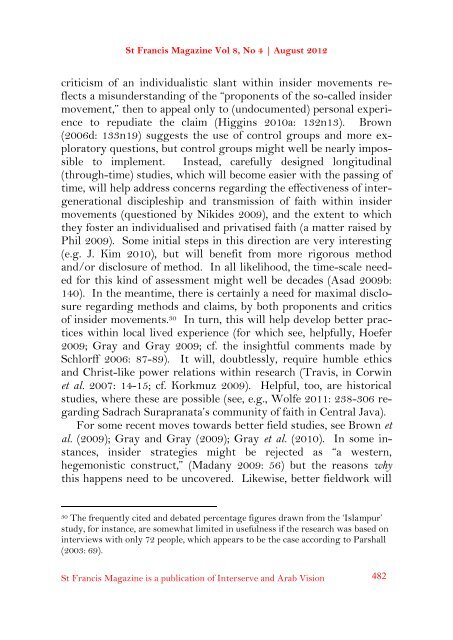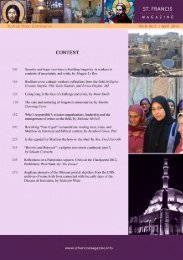download the pdf - St.Francis Magazine
download the pdf - St.Francis Magazine
download the pdf - St.Francis Magazine
You also want an ePaper? Increase the reach of your titles
YUMPU automatically turns print PDFs into web optimized ePapers that Google loves.
<strong>St</strong> <strong>Francis</strong> <strong>Magazine</strong> Vol 8, No 4 | August 2012<br />
criticism of an individualistic slant within insider movements reflects<br />
a misunderstanding of <strong>the</strong> “proponents of <strong>the</strong> so-called insider<br />
movement,” <strong>the</strong>n to appeal only to (undocumented) personal experience<br />
to repudiate <strong>the</strong> claim (Higgins 2010a: 132n13). Brown<br />
(2006d: 133n19) suggests <strong>the</strong> use of control groups and more exploratory<br />
questions, but control groups might well be nearly impossible<br />
to implement. Instead, carefully designed longitudinal<br />
(through-time) studies, which will become easier with <strong>the</strong> passing of<br />
time, will help address concerns regarding <strong>the</strong> effectiveness of intergenerational<br />
discipleship and transmission of faith within insider<br />
movements (questioned by Nikides 2009), and <strong>the</strong> extent to which<br />
<strong>the</strong>y foster an individualised and privatised faith (a matter raised by<br />
Phil 2009). Some initial steps in this direction are very interesting<br />
(e.g. J. Kim 2010), but will benefit from more rigorous method<br />
and/or disclosure of method. In all likelihood, <strong>the</strong> time-scale needed<br />
for this kind of assessment might well be decades (Asad 2009b:<br />
140). In <strong>the</strong> meantime, <strong>the</strong>re is certainly a need for maximal disclosure<br />
regarding methods and claims, by both proponents and critics<br />
of insider movements. 30 In turn, this will help develop better practices<br />
within local lived experience (for which see, helpfully, Hoefer<br />
2009; Gray and Gray 2009; cf. <strong>the</strong> insightful comments made by<br />
Schlorff 2006: 87-89). It will, doubtlessly, require humble ethics<br />
and Christ-like power relations within research (Travis, in Corwin<br />
et al. 2007: 14-15; cf. Korkmuz 2009). Helpful, too, are historical<br />
studies, where <strong>the</strong>se are possible (see, e.g., Wolfe 2011: 238-306 regarding<br />
Sadrach Surapranata’s community of faith in Central Java).<br />
For some recent moves towards better field studies, see Brown et<br />
al. (2009); Gray and Gray (2009); Gray et al. (2010). In some instances,<br />
insider strategies might be rejected as “a western,<br />
hegemonistic construct,” (Madany 2009: 56) but <strong>the</strong> reasons why<br />
this happens need to be uncovered. Likewise, better fieldwork will<br />
30 The frequently cited and debated percentage figures drawn from <strong>the</strong> ‘Islampur’<br />
study, for instance, are somewhat limited in usefulness if <strong>the</strong> research was based on<br />
interviews with only 72 people, which appears to be <strong>the</strong> case according to Parshall<br />
(2003: 69).<br />
<strong>St</strong> <strong>Francis</strong> <strong>Magazine</strong> is a publication of Interserve and Arab Vision 482







![Reflections on Surah Fatiha and the Lord's Prayer[1] - St.Francis ...](https://img.yumpu.com/49377951/1/184x260/reflections-on-surah-fatiha-and-the-lords-prayer1-stfrancis-.jpg?quality=85)









